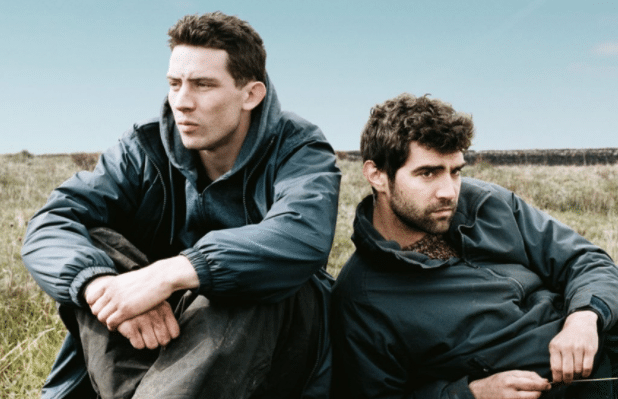
From God’s Own Country to Call Me By Your Name, is this year’s crop of queer films the strongest yet?
10 Battle of the Sexes
Movies featuring prominent LGBTI characters are usually, for better or for worse, made on a shoestring budget. But not sports drama Battle of the Sexes, funded to the tune of a cool $25m (£18.5m, €21.3m).
Currently making its impact worldwide (grossing $17.5m thus far), it’s no doubt benefiting from the star power of Emma Stone, winner of the 2017 Best Actress Oscar for La La Land.
She turns in another charming performance as former World No. 1 professional tennis player Billie Jean King. The year is 1973, and the star is having all manner of personal and professional crises in the lead up to her dramatic ‘battle of the sexes’ tennis match with fellow champ (and self-confessed chauvinist) Bobby Riggs.
Steve Carrell, although arguably in on the joke, is completely intolerable as Riggs: it’s his most irritating and nasally role ever. The scenes where Billie falls for hairdresser Marilyn Barnett (Andrea Riseborough) are more pleasing, all soft focus, extreme close ups and Emma’s infectious laugh.
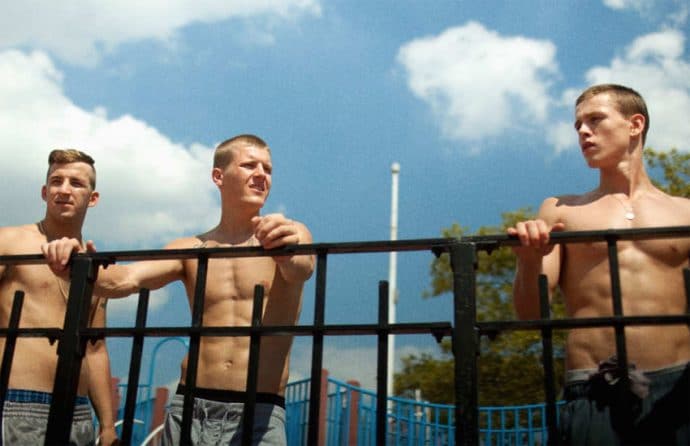 9 Beach Rats
9 Beach Rats
Cards on the table: I was a little disappointed by Beach Rats. Or rather, I didn’t particularly enjoy it. But then again, I’m not sure I was meant to.
Despite the abundance of eye-catching torsos on display, there’s little beauty in this cold, detached portrait of closeted Frankie, a grunting, taciturn teen played handsomely by British actor Harris Dickinson.
Set in a downtrodden pocket of Coney Island, an apparently unemployed Frankie wiles away a summer desperately trying to conceal his sexuality from his grossly ignorant pack of waster friends, whose toxic masculinity is abhorrent to behold.
Sure, anyone who’s ever concealed their sexuality can theoretically relate to Frankie. But nothing, not even the death of his father, justifies the shitty things he says and does. As a window into what being in the closet can mean in 2017, Beach Rats is invaluable. But I’m in no hurry to see it again.
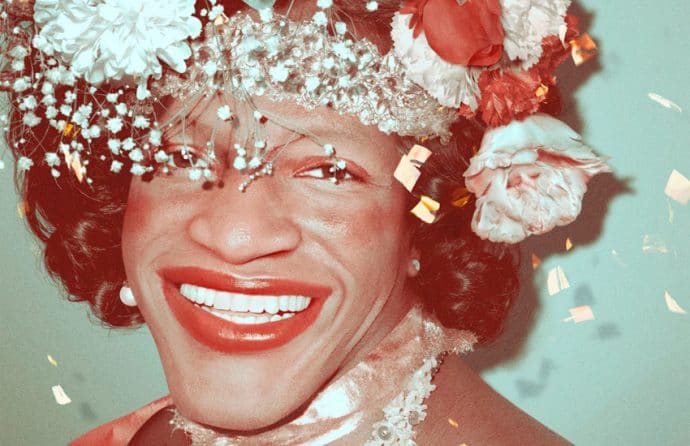 8 The Death and Life of Marsha P. Johnson
8 The Death and Life of Marsha P. Johnson
As recently as last year, late NYC trans activist Marsha P. Johnson was criminally at risk of being a footnote in LGBTI history.
This year, she’s the subject of a Netflix documentary, meaning her founding role in the Stonewall Riots and her untimely, mysterious death (her loved ones cast doubt on the official line, that she committed suicide in 1992) are now privy to countless eyes and ears.
Albeit, this slight documentary isn’t quite the powerful exaltation of Marsha’s legend it could’ve been. Indeed, the Netflix platform and the sheer force of personality of its subject do most of the heavy lifting.
But it’s a respectful tribute. Its gentle pulse is the crushing, muted struggle of fellow activist Victoria Cruz, as she revisits her old friend’s death 25 years later. It’s through her lens we explore the mystery – only for it to become frustratingly more complex.
 7 This Is Everything: Gigi Gorgeous
7 This Is Everything: Gigi Gorgeous
Despise the YouTube generation? The rise of Insta-celebrities? Ordinary people who carry on like they are a Kardashian? The beautiful Gigi Gorgeous (2,773,956 YouTube subscribers and counting) will make you see things differently in this warm, detailed portrait.
This Montreal-born force of nature rose to fame in 2008, initially celebrated for her make up tutorials before bravely documenting her gender transition 2013. This Is Everything delves deeper into her journey, from adorable giggling baby in her father’s home movies to the Fashion Week-attending star she is today.
Instagram filters begone: historic YouTube footage is tempered with intensely personal interviews with Gigi, her friends, family and colleagues. The end result feels nakedly honest. It’s got to be said, Gigi comes across amazingly. She exudes strength and love constantly, whether recovering from surgery or dealing with her mother’s death.
She’s shown interacting with fans several times throughout the 90 minute film; half are in tears as they thank her for being such an inspiration. Perhaps it’s just editing, but you get the impression it’s a daily occurrence for Gigi, and she’s so gracious with it. If only all celebrities used fame in this way.
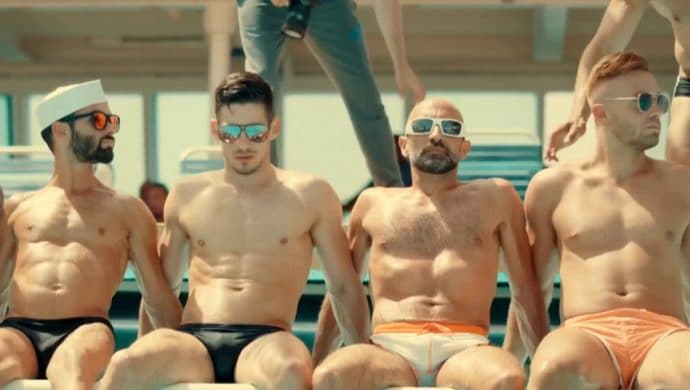 6 Dream Boat
6 Dream Boat
Ever fancied going on a gay cruise, but not sure if you’d love it or hate it? This documentary, charting the voyage of almost 3,000 gay men from Lisbon and the Canary Islands, will clear up any doubts.
Director Tristan Milewski pulls no punches in his depiction of this mass jockstrapathon: there’s a very public blow job, and in one wince-inducing scene, cleaners are seen thanklessly removing used condoms from decking the morning after a party.
But it’s also emotionally graphic: Milewski’s main victory is his impeccable choice of interviewees, all fascinating, thoughtful guys you know it’d be fun to travel with.
They routinely bare their souls as they gussy themselves up for that evening’s festivities. One impersonates Sia, wig and all, and starts walking into people. It’s hilarious.
There’s the Palestinian guy who recently nursed his Belgian boyfriend through cancer. The French guy who lost the use of his legs before 30. The Austrian photographer with HIV. My favorite, the beautiful, muscular Marek from Poland, yearns so deeply for love he bursts into tears at the mere prospect of a hook up.
But India-born, Dubai-residing Dipankar, a solo traveler, is arguably the most interesting. Hearing him speak in broken English with inexplicable eloquence about gay male body fascism is one of many powerfully resonant moments in the film.
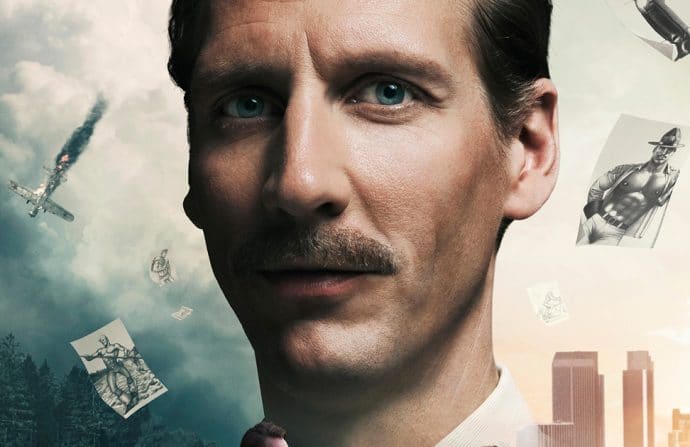 5 Tom of Finland
5 Tom of Finland
Three of the films on this list are documentaries; others have a decidedly documentary feel. Not TOF. Based on the life of iconic gay artist Touko Laaksonen, it’s hyperbolic, epic in scope and lustrously sexy – just like the artist’s oeuvre.
Some have called it sanitized, which is an overstatement. Yes, director Dome Karukoski (who’s married to a woman) is light-handed with the sex scenes. Unwarranted, perhaps, given the art in question.
But this is a biopic. It’s overblown, but still somewhat true to life. In other words, it’s not quite the bulging fantasy world depicted in Tom’s art. Which, as we learn, he created to escape homophobic 1940s Helsinki, as well as the horrors he witnessed in WW2.
Fans after something rawer will have to wait: that’s another movie for another time. And perhaps a very good movie it will be, too.
But this is about quality, well-acted storytelling. Tom’s competitive relationship with his sister – also an artist, and one who never approved of his work, despite caring about him – is just one absorbing strand of the film.
But don’t be mistaken for thinking it panders to a straight audience. The sense of man-on-man sexual desire intoxicates. The guys are all uniformly gorgeous. And there’s more sensuality in main actor Pekka Strang’s moustached upper lip than most porn films, I assure you.
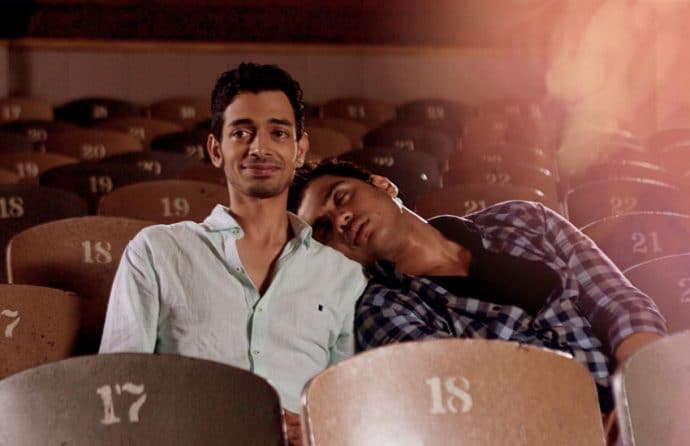 4 Loev
4 Loev
This obscure indie from India was filmed in 2014, debuting at film festivals the following year. It’s a gentle story of love between two old friends that was in danger of being forgotten until Netflix acquired worldwide distribution rights this year. Then, finally, it found a large audience. And with it, renewed critical praise.
Quite right too: Loev is an wonderful movie, and one that goes in quite a brave, unexpected direction in its third act.
In truth, it defies expectation throughout: the obstacles facing the main characters have little to do with their being gay, or, indeed, even homosexuality being illegal in India. This might seem faintly ridiculous, but it’s inspired by director Sudhanshu Saria’s own experience. As a viewer you quickly feel at home in the guys’ liberal bubble.
As such, would-be lovers Jai and Sahil don’t even encounter homophobia as they flirt their way through a reunion-road trip from Mumbai to the otherworldly Western Ghats, aside from a few ambiguous looks.
But of course it’s not all plain sailing. There are echoes of the quiet devastation of Weekend (2014) and the emotional torture of Happy Together (1997). Meanwhile, the two-men-in-a-hotel-room scenario is as revealing and intimate as last year’s The Pass.
Loev is all the more saddening given its star, Dhruv Ganesh, tragically passed away in 2015 at the age of 29, after contracting tuberculosis. His faultless performance and beautiful, yearning eyes truly tug at the heartstrings.
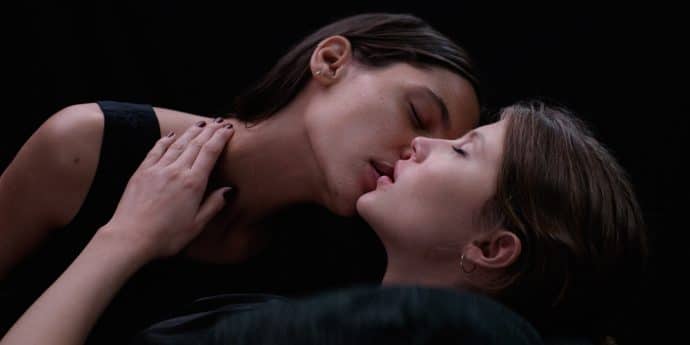 3 Thelma
3 Thelma
From India to Norway, and Joachim Trier’s unbearably creepy, meditative chiller Thelma. Loev’s Jai and Sahil had relatively few issues with their sexualities; not so for Thelma, a beautiful, beguiling but maddeningly shy student struggling with her first term at an Oslo uni.
Thelma’s attempt to take flight into adulthood fails spectacularly; shame and repression lead to loneliness, a possible eating disorder and psychological non-epileptic seizures that are unbearable to watch. When she falls for one of her few female friends, all hell breaks loose.
Meanwhile, brief flashbacks to Thelma’s difficult upbringing at the hands of controlling, deeply Christian parents (in a fantastically harsh coastal location) speak volumes.
But the story runs deeper. The supernatural slowly takes over, evading the absurd thanks to a reserved pace and some strikingly compelling visuals from director Joachim Trier.
It’s a minimalist feast for the eyes. Even a simple, shadowy shot of star Eili Harboe riding a bus is imbued with tension and mystery. And the foreboding, operatic soundtrack is everything.
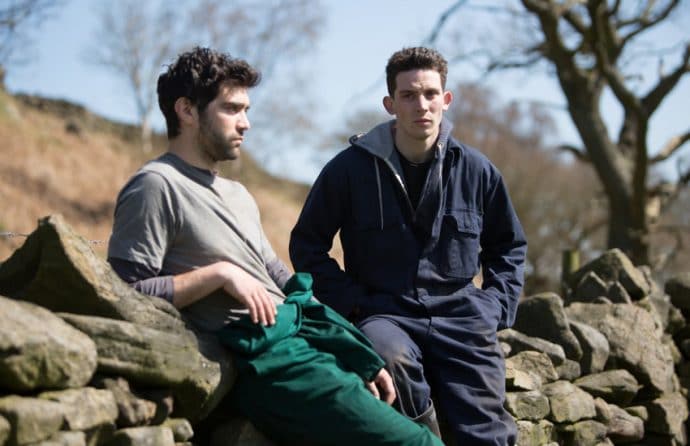 2 God’s Own Country
2 God’s Own Country
Coming from the country myself, I’ve long-perceived agriculture as romantic. And indeed, when Romanian immigrant Gheorghe finds work at a Yorkshire farm and resuscitates a dying lamb, before incubating it in his coat, I swooned uncontrollably.
So too does the moody Johnny. Until Gheorghe came along, this hard-drinking teen had been living a joyless, not to mention penniless, existence on the farm along with his father and grandmother.
Thus, farming isn’t really romanticised at all. Director Francis Lee is unflinching in his depiction of the family business in decline, shooting in an unforgiving, naturalistic style. Animals are born and die in extreme close up; the lack of dialogue is as difficult to endure as the heinous weather.
When Johnny and Gheorghe set about repairing of a wall – in complete silence – for about 100 years, the pursuit strikes you as at once valiant and harrowingly boring. Things liven up later, of course, when they end up having rough sex in the mud.
Despite the lack of dialogue, there are swellings of emotion. Love and fear are communicated with the furrow of a brow or the narrowing of eyes. Especially through Gemma Jones as Johnny’s grandmother, so exaggerated in the Harry Potter films but so fraught and desolate here.
But then, relief. After scene after scene of grey, empty landscapes, the guys catch sight of the rolling hills from just the right viewpoint, in just the right light. The scene is consoling in its beauty, as if salvation were within touching distance of these two lost souls – or maybe standing right beside them.
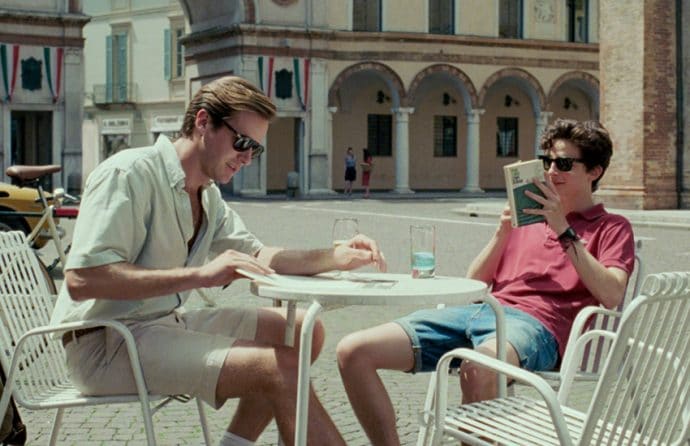 1 Call Me By Your Name
1 Call Me By Your Name
Truly amazing films about queer people often make for punishing viewing. Moonlight, Brokeback Mountain – don’t get me started on Boys Don’t Cry.
Love and sex battle with hatred and violence. Conclusions are tragic. Watching these films rarely feels good.
Call Me By Your Name, about an American student who spends a lazy summer in Italy assisting his professor before falling for his son, is different. Homosexual love – between gifted, libidinous 17-year-old Elio (Homeland’s Timothée Chalamet) and sultry, strapping 20-something Oliver (The Social Network’s Armie Hammer), in 80s Italy of all places – is permitted to flourish.
To clarify, don’t expect a sweet, sickly rom com. The wait for the principal players to get it on is agonizing. It makes up the vast majority of openly gay director Luca Guadagnino’s languid 130 minutes, and said flourishing is brief – but thankfully not too brief.
There’s pain too. But it’s deliciously melancholic. There’s no darkness. I steeled myself for the inevitability of prejudice – as the guys skip drunkenly down an empty street, when Elio opens up to his father about the affair – but no such moment arrives. Everyone in the movie is a good person.
Sound too good to be true? It’s allowed to be. It’s fiction, based semi-faithfully on André Aciman’s 2007 novel of the same name. (Fans of the book have slammed the comparable lack of explicit sex; for me it’s a criticism that certainly stands up stronger than with Tom of Finland).
For the most part the movie exists on a different plane – the unreliable world of Elio’s memory, perhaps. The dense foliage and the hanging fruit of his parents’ gorgeous, ramshackle mansion conjure thoughts of the Garden of Eden. But there’s no fall, per se.
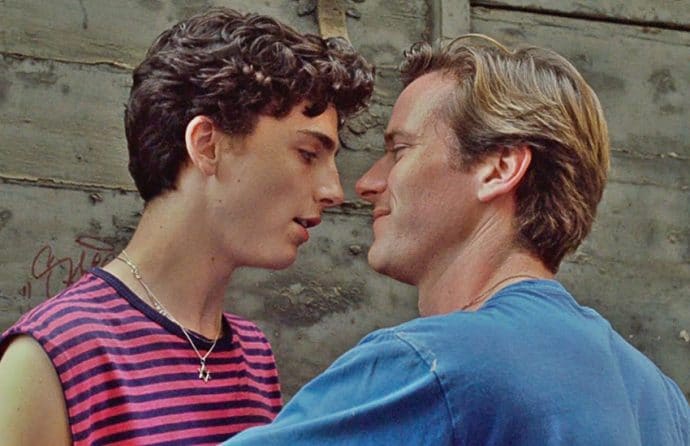
Hammer seduces with his booming voice and statuesque physicality, but the movie belongs to Chalamet. On paper, Elio is dislikable. An awkward, arrogant intellectual who speaks three languages and plays piano and guitar. He’s a rich kid who gets to hang out and read all summer: why the hell doesn’t he get a job?
But you quickly fall in love with him, too. After regarding Oliver like a shaking, frightened gazelle would a predator, he gets plucky. He sarcastically imitates his crush’s performed, all-American manliness and the dynamic between them palpably shifts. I didn’t see it coming and my heart skipped a beat. It’s as heightened and erotic a moment as the now-famous peach-fucking scene.
Guadagnino’s luxurious palette and harnessing of light elevate the story. So does the piano-led soundtrack, including three moving contributions from Sufjan Stevens. A near-perfect movie.







